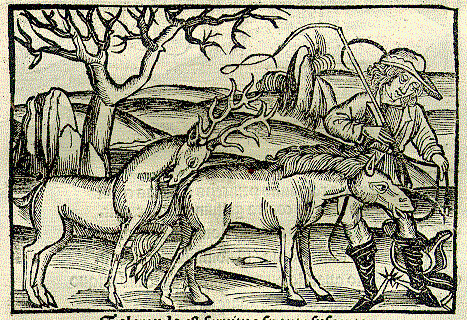The humble slaves of men.
When, in the far-off past,
The fare of gentlemen was mast,
And even hats were never felt,
Horse, ass, and mule in forests dwelt.
Nor saw one then, as in these ages,
So many saddles, housings, pillions;
Such splendid equipages,
With golden-lace postilions;
Such harnesses for cattle,
To be consumed in battle;
As one saw not so many feasts,
And people married by the priests.
The horse fell out, within that space,
With the antler'd stag, so fleetly made:
He could not catch him in a race,
And so he came to man for aid.
Man first his suppliant bitted;
Then, on his back well seated,
Gave chase with spear, and rested not
Till to the ground the foe he brought.
This done, the honest horse, quite blindly,
Thus thank'd his benefactor kindly:--
'Dear sir, I'm much obliged to you;
I'll back to savage life. Adieu!'
'O, no,' the man replied;
'You'd better here abide;
I know too well your use.
Here, free from all abuse,
Remain a liege to me,
And large your provender shall be.'
Alas! good housing or good cheer,
That costs one's liberty, is dear.
The horse his folly now perceived,
But quite too late he grieved.
No grief his fate could alter;
His stall was built, and there he lived,
And died there in his halter.
Ah! wise had he one small offence forgot!
Revenge, however sweet, is dearly bought
By that one good, which gone, all else is nought.
Source: Wright's translation of La Fontaine, Fable 4.13.
Click here for a SLIDESHOW of all the Brant images. I really like the way the artist conveys how intense the conflict was between the stag and the horse! The stag is really pushing the horse into an alliance with the man, at such a high cost to the horse.
M0269 Perry269

No comments:
Post a Comment